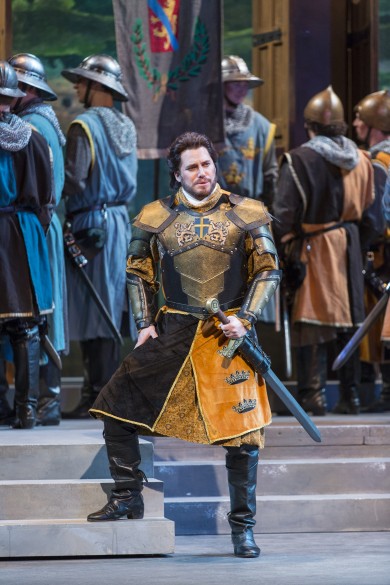Superb singing provides fine advocacy for Verdi’s “Legnano” at Sarasota Opera

Martin Nusspaumer is Arrigo in Verdi’s “La battaglia di Legnano” at Sarasota Opera. Photo: Rod Millington
“Viva Italia!” are the first words heard in La battaglia di Legnano, Verdi’s rarely heard fourteenth opera, which opened Saturday night at Sarasota Opera. Few Verdi works are as imbued with a specifically Italian nationalism as Legnano, which makes it an ideal opera to present in this final year of the company’s long-running Verdi cycle.
Giuseppe Verdi was a ferociously proud Italian and, though he didn’t live to see his country reunited, Legnano is bursting with avowals of patriotism and determination to defend the nation until the death.
Composed in 1848–in Paris, oddly enough–The Battle of Legnano concerns a 12th-century invasion of Lombardy by the Germans, led by Frederick Barbarossa. There was clearly a reflection of the contemporary political situation when Republic-minded Italian cities were attempting to put aside their differences and join forces to resist Austrian domination. That subtext couldn’t be clearer in the scene in which Arrigo and Rolando attempt to enlist the quisling magistrates of Como into their cause, only to be confronted by Barbarossa (Federico) himself. Arrigo’s dying words at the opera’s close, “Who dies for his country cannot have a guilty soul,” make Verdi’s nationalist theme manifest.
The political action is set against a love triangle between the Veronese soldier Arrigo, his former lover Lida, and the Milanese general Rolando. Lida has married Rolando and borne a child with him, after believing Arrigo, who has been missing for years, is dead. When Arrigo discovers Lida has married his longtime friend, he is furious and in despair. The malign German prisoner Marcovaldo intercepts Lida’s letter to Arrigo and delivers it to Rolando, who mistakenly accuses Lida of infidelity and Arrigo of betrayal. He belatedly realizes his error and forgives Lida and Arrigo, as his friend dies–for real this time–of battle wounds fighting nobly for Italy.
The plot has its decidedly creaky moments and some of the dramatic confrontations elicited chuckles on opening night, unaided by Martha Collins’ stiff and stodgy stage direction.
As in much early Verdi, there are some dramatic howlers: why can’t Arrigo forgive Lida for marrying Rolando since she thought he was dead? Why does Rolando allow a German prisoner to roam freely through his family’s home? And how the hell does Arrigo survive jumping off a high castle wall?
Yet one can always find great moments in even the most obscure Verdi operas and Legnano has several inspired set pieces, making one wonder why the opera remains so neglected. (The U.S. premiere didn’t take place until 1976.) There are several magnificent choruses, a terrific trio, and superb solo arias for each of the principals. Consistently inspired singing by the three leads made the gaping dramatic voids easier to overlook and one could just sit back and enjoy Verdi’s musical riches.
Martin Nusspaumer made a striking impression as Arrigo. The handsome Uruguayan cut a dashing figure that belied the fact that the Veronese warrior is something of a wuss–threatening suicide when he learns Lida has married Rolando and constantly wallowing in self-pity. Nusspaumer’s singing was excellent throughout, virile and showcasing a heroic tenor with clarion top notes. Nusspaumer’s voice soaring thrillingly over the large chorus in massed ensembles.
Jennifer Black was similarly successful in her company debut as Lida. The role is rather thankless, requiring a lot of being put upon and aggrieved, but Black’s fine vocalism made the most of her possibilities. She showed a gleaming and flexible soprano in “Quante volte come un dono” and a delicious lilt in the cabaletta-like section, with exciting high notes.
As Rolando, Todd Thomas’s gravelly baritone sounded rather frayed early in the evening but he sang with greater strength and security as the performance unfolded. He brought great feeling to his Act 3 duet with Lida (“Digli ch’e sangue italico”) and expressive poise to “Se al nuovo di pugnando.” Thomas remains a superb actor and he registered Rolando’s conflicted fury, paternal affection and forgiveness convincingly. It was good to see Sarasota’s go-to verismo baritone for decades participate in this final Verdi season.
Despite an awkwardly staged entrance, the sonorous bass of company stalwart Young Bok Kim made an impact in the small role of Federico.
The villain Marcovaldo is one of the weirdest characters in Verdi–sort of a Dick Deadeye of Milan. Harold Wilson’s tall stature and somewhat amorphous bass seemed apt for the strange role. Tara Curtis was capable as the maid Imelda, and the powerful singing of the chorus, under Roger L. Bingaman’s direction, was quite sensational.
Over the years of the Verdi cycle, one has seen the same castle walls and porticos so many times, you almost feel you know each brick and flag personally. Though elements looked quite familiar, the sets by Jeffrey W. Dean, costumes by Howard Tsvi Kaplan, and lighting by Ken Yunker got the job done in the company’s favored clean-lined traditionalism.
One has long since run out of adjectives to describe Victor DeRenzi’s supreme Verdi conducting. The company’s artistic director brought out the passion and delicacy of the music with such complete dramatic intensity, concentration and musical integrity, that the libretto’s lapses seemed wholly irrelevant.
La battaglia di Legnano runs through March 18. sarasotaopera.org.